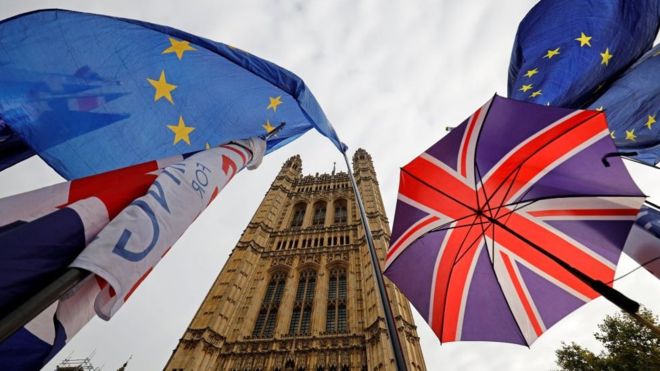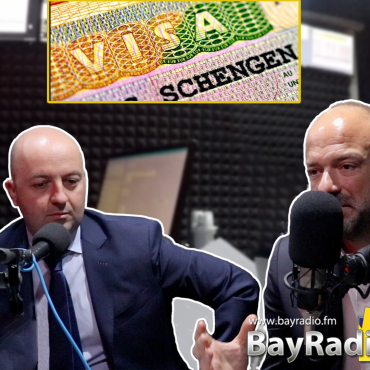-
 play_arrow
play_arrow
BayRadio Listen Live Broadcasting in Spain


It’s a grim winter’s day in Berlin, and the political climate matches the weather. Everywhere Angela Merkel looks there are storm clouds, as the values she has upheld all her career come under sustained attack. At the start of a new decade, Europe’s premier stateswoman suddenly seems to be on the wrong side of history.
Shortly, the UK will leave the EU. A volatile US president is snubbing allies and going it alone in the Middle East. Vladimir Putin is changing the Russian constitution and meddling in Libya and sub-Saharan Africa. Trade tensions continue, threatening the open borders and globalised value chains that are the cornerstones of Germany’s prosperity.
Ms Merkel, a former physicist renowned for her imperturbable, rational manner is a politician programmed for compromise. But today she faces an uncompromising world where liberal principles have been shoved aside by the law of the jungle.
Her solution is to double down on Europe, Germany’s anchor. “I see the European Union as our life insurance,” she says. “Germany is far too small to exert geopolitical influence on its own, and that’s why we need to make use of all the benefits of the single market.”
Speaking in the chancellery’s Small Cabinet Room, an imposing wood-panelled hall overlooking Berlin’s Tiergarten park, Ms Merkel does not come across as under pressure. She is calm, if somewhat cagey, weighing every word and seldom displaying emotion.
But the message she conveys in a rare interview is nonetheless urgent. In the twilight of her career – her fourth and final term ends in 2021 – Ms Merkel is determined to preserve and defend multilateralism, a concept that in the age of Trump, Brexit and a resurgent Russia has never seemed so embattled.
This is the “firm conviction” that guides her: the pursuit of “the best win-win situations . . . when partnerships of benefit to both sides are put into practice worldwide”.
She admits that this idea is coming “under increasing pressure”. The system of supranational institutions like the EU and United Nations were, she says, “essentially a lesson learned from the second world war, and the preceding decades”. Now, with so few witnesses of the war still alive, the importance of that lesson is fading.
Of course US president Donald Trump is right that bodies such as the World Trade Organisation and the UN require reform. “There is no doubt whatsoever about any of that,” she says. “But I do not call the world’s multilateral structure into question.”
Nato beneficiary
Germany has been the great beneficiary of Nato, an enlarged EU and globalisation. Free trade has opened up vast new markets for its world-class cars, machines and chemicals. Sheltered under the US nuclear umbrella, Germany has barely spared a thought for its own security. But the rise of “Me First” nationalism threatens to leave it economically and politically unmoored. In this sense, Europe is existential for German interests, as well as its identity.
Ms Merkel therefore wants to strengthen the EU – an institution that she, perhaps more than any other living politician, has come to personify. She steered Europe through the euro zone debt crisis, albeit somewhat tardily: she held Europe together as it imposed sanctions on Russia over the annexation of Crimea; she maintained unity in response to the trauma of Brexit.
The UK’s departure will continue to hang over Brussels and Berlin – the countdown for a trade deal will coincide with Germany’s presidency of the EU in the second half of this year. Berlin worries a post-Brexit UK that reserves the right to diverge from EU rules on goods, workers’ rights, taxes and environmental standards could create a serious economic competitor on its doorstep.
But Ms Merkel remains a cautious optimist. Brexit is a “wake-up call” for the EU. Europe must, she says, respond by upping its game, becoming “attractive, innovative, creative, a good place for research and education . . . Competition can then be very productive.”
This is why the EU must continue to reform, completing the digital single market, progressing with banking union – a plan to centralise the supervision and crisis management of European banks – and advancing capital markets union to integrate Europe’s fragmented equity and debt markets.
In what sounds like a new European industrial policy, Ms Merkel also says the EU should identify the technological capabilities it lacks and move fast to fill in the gaps. “I believe that chips should be manufactured in the European Union, that Europe should have its own hyperscalers and that it should be possible to produce battery cells,” she says.
It must also have the confidence to set the new global digital standards. She cites the example of the General Data Protection Regulation, which supporters see as a gold standard for privacy and proof that the EU can become a rulemaker, rather than a rule taker, when it comes to the digital economy.
Europe can offer an alternative to the US and Chinese approach to data.
“I firmly believe that personal data does not belong to the state or to companies,” she says. “It must be ensured that the individual has sovereignty over their own data and can decide with whom and for what purpose they share it.”
The continent’s scale and diversity also make it hard to reach a consensus on reform. Europe is deeply split: the migration crisis of 2015 opened up a chasm between the liberal west and countries such as Viktor Orban’s Hungary which has not healed. Even close allies like Germany and France have occasionally locked horns: Berlin’s cool response to Emmanuel Macron’s reform initiatives back in 2017 triggered anger in Paris, while the French president’s unilateral overture to Mr Putin last year provoked irritation in Berlin.
Euro zone reform
And when it comes to reform of the euro zone, divisions still exist between fiscally challenged southern Europeans and the fiscally orthodox new Hanseatic League of northern countries. Ms Merkel remains to a degree hostage to German public opinion.
Germany, she admits, is still “slightly hesitant” on banking union, “because our principle is that everyone first needs to reduce the risks in their own country today before we can mutualise the risks”. And capital markets union might require member states to seek closer alignment on things such as insolvency law.
These divisions pale in comparison to the gulf between Europe and the US under president Donald Trump. Germany has become the administration’s favourite punching bag, lambasted for its relatively low defence spending, big current account surplus and imports of Russian gas. German business dreads Mr Trump making good on his threat to impose tariffs on European cars.
It is painful for Ms Merkel, whose career took off after unification. In an interview last year she described how, while coming of age in communist East Germany, she yearned to make a classic American road trip: “See the Rocky Mountains, drive around and listen to Bruce Springsteen – that was my dream,” she told Der Spiegel.
The poor chemistry between Ms Merkel and Mr Trump has been widely reported. But are the latest tensions in the German-US relationship just personal, or is there more to it?
“I think it has structural causes,” she says.
For years now, Europe and Germany have been slipping down the US’s list of priorities. “There’s been a shift,” she says. “President Obama already spoke about the Asian century, as seen from the US perspective. This also means that Europe is no longer, so to say, at the centre of world events.”
She adds: “The United States’ focus on Europe is declining – that will be the case under any president.”
The answer? “We in Europe, and especially in Germany, need to take on more responsibility.”
Germany has vowed to meet the Nato target of spending 2 per cent of GDP on defence by the start of the 2030s. Ms Merkel admits that for those alliance members which have already reached the 2 per cent goal, “naturally this is not enough”. But there’s no denying Germany has made substantial progress on the issue: its defence budget has increased by 40 per cent since 2015, which is “a huge step from Germany’s perspective”.
Transatlantic relationship
Ms Merkel insists the transatlantic relationship “remains crucial for me, particularly as regards fundamental questions concerning values and interests in the world”. Yet Europe should also develop its own military capability. There may be regions outside Nato’s primary focus where “Europe must – if necessary – be prepared to get involved. I see Africa as one example,” she says.
Defence is hardly the sole bone of contention with the US. Trade is a constant irritation. Berlin watched with alarm as the US and China descended into a bitter trade war in 2018: it still fears becoming collateral damage.
“Can the European Union come under pressure between America and China? That can happen, but we can also try to prevent it.”
Germany has few illusions about China. German officials and businesspeople are just as incensed as their US counterparts by China’s theft of intellectual property, its unfair investment practices, state-sponsored cyber-hacking and human rights abuses in regions like Xinjiang. Once seen as a strategic partner, China is increasingly viewed in Berlin as a systemic rival.
But Berlin has no intention of emulating the US policy of “decoupling” – cutting its diplomatic, commercial and financial ties with China. Instead, Ms Merkel has staunchly defended Berlin’s close relationship with Beijing. She says she would “advise against regarding China as a threat simply because it is economically successful”.
“As was the case in Germany, [China’s] rise is largely based on hard work, creativity and technical skills,” she says. Of course there is a need to “ensure that trade relations are fair”. China’s economic strength and geopolitical ambitions mean it is a rival to the US and Europe. But the question is: “Do we in Germany and Europe want to dismantle all interconnected global supply chains . . . because of this economic competition?” She adds: “In my opinion, complete isolation from China cannot be the answer.”
Her plea for dialogue and co-operation has set her on a collision course with some in her own party. China hawks in her Christian Democratic Union share US mistrust of Huawei, the Chinese telecoms equipment group, fearing it could be used by Beijing to conduct cyber espionage or sabotage.
Ms Merkel has pursued a more conciliatory line. Germany should tighten its security requirements towards all telecoms providers and diversify suppliers “so that we never make ourselves dependent on one firm” in 5G. But “I think it is wrong to simply exclude someone per se,” she says.
Rise of China
The rise of China has triggered concern over Germany’s future competitiveness. And that economic “angst” finds echoes in the febrile politics of Ms Merkel’s fourth term. Her “grand coalition” with the Social Democrats is wracked by squabbling. The populist Alternative for Germany is now established in all 16 of the country’s regional parliaments. A battle has broken out for the post-Merkel succession, with a crop of CDU heavy-hitters auditioning for the top job. Many in the political elite worry about waning international influence in the final months of the Merkel era.
While she remains one of the country’s most popular politicians, Germans are asking what her legacy will be. For many of her predecessors, that question is easy to answer: Konrad Adenauer anchored postwar Germany in the west; Willy Brandt ushered in detente with the Soviet Union; Helmut Kohl was the architect of German reunification. So how will Ms Merkel be remembered?
She brushes away the question. “I don’t think about my role in history – I do my job.” But what about critics who say the Merkel era was mere durchwurschteln – muddling through? That word, she says, in a rare flash of irritation, “isn’t part of my vocabulary”.
Despite her reputation for gradualism and caution, Ms Merkel will doubtless be remembered for two bold moves that changed Germany – ordering the closure of its nuclear power stations after the Fukushima disaster of 2011, and keeping the country’s borders open at the height of the 2015 refugee crisis.
That decision was her most controversial, and there are some in Germany who still won’t forgive her for it. But officials say Germany survived the influx, and has integrated the more than 1 million migrants who arrived in 2015-16.
She prefers to single out less visible changes. Germany is much more engaged in the world: just look, she says, at the Bundeswehr missions in Africa and Afghanistan. During the Kohl era, even the idea of dispatching a ship to the Adriatic to observe the war in Yugoslavia was controversial.
Ukraine
She also mentions efforts to end the war in Ukraine, its role in the Iran nuclear deal, its assumption of ever more “diplomatic, and increasingly also military responsibility”. “It may become more in future, but we are certainly on the right path,” she says.
The Merkel era has been defined by crisis but thanks to her stewardship most Germans have rarely had it so good. The problem is the world expects even more of a powerful, prosperous Germany and its next chancellor. – Copyright The Financial Times Limited 2020.
Written by: BayRadio News
Similar posts
Recent Posts
- Robotic Surgery for Prostate Cancer: What Is Radical Prostatectomy and How Does the Da Vinci Robot Improve It
- What Is Fibromyalgia? Symptoms and Treatments of an Invisible Illness That Requires Specialized Attention
- AMASVISTA Glass: 10 reasons to choose SUNFLEX glass curtains
- Robotic Surgery, Immunotherapy and Comprehensive Care Take Centre Stage at Pancreatic Cancer Conference at Quirónsalud Torrevieja
- Robotic Surgery Against Ovarian Cancer: Greater Precision, Less Pain and Faster Recovery

Ctra. Cabo La Nao, CC La Nao, Local 6 03730 Javea, Alicante, Spain
Advertise with us
Do you have a business in Spain? Do you provide a service to the expat community in Spain? Would you like your message to reach over 500.000 people on a weekly basis?
BayRadio is a community orientated radio station offering fantastic content to our many listeners and followers across our various platforms. Contact us now and find out what Bay can do for you!
Our business is helping your business grow.
BAY RADIO S.L. © 2024. ALL RIGHTS RESERVED. WEB DESIGN BY MEDIANIC







